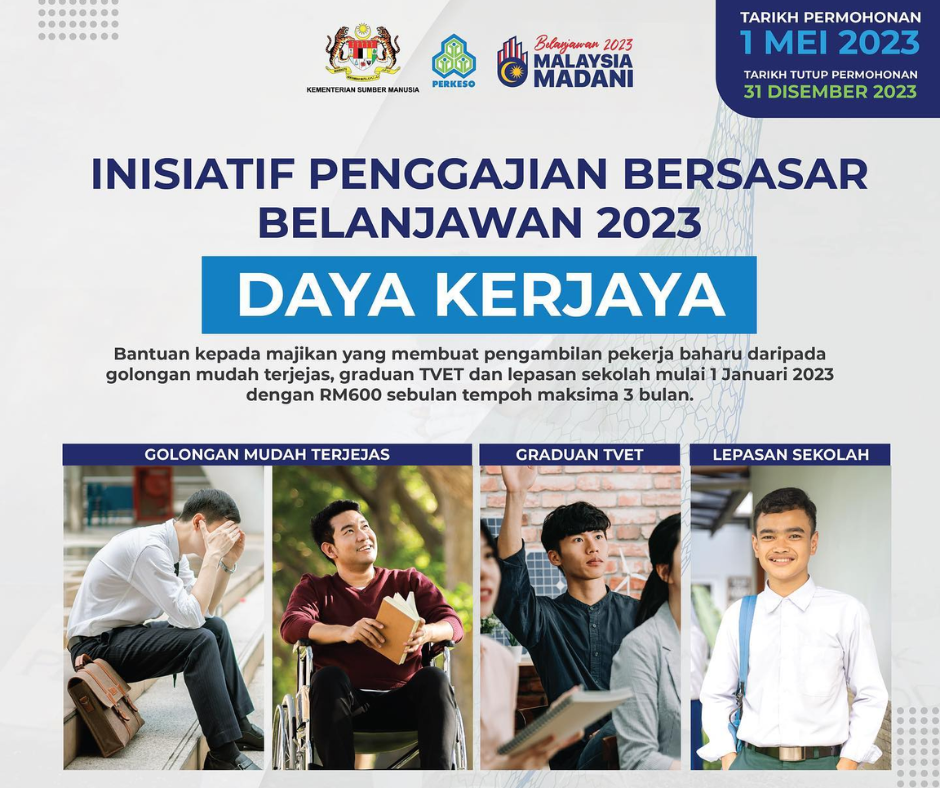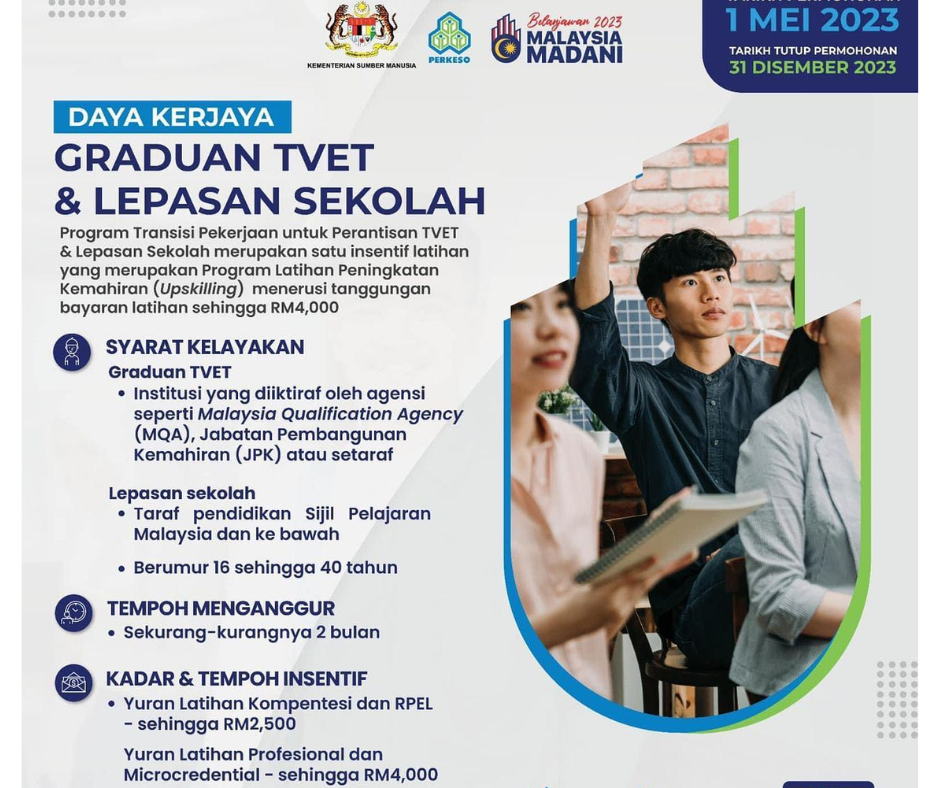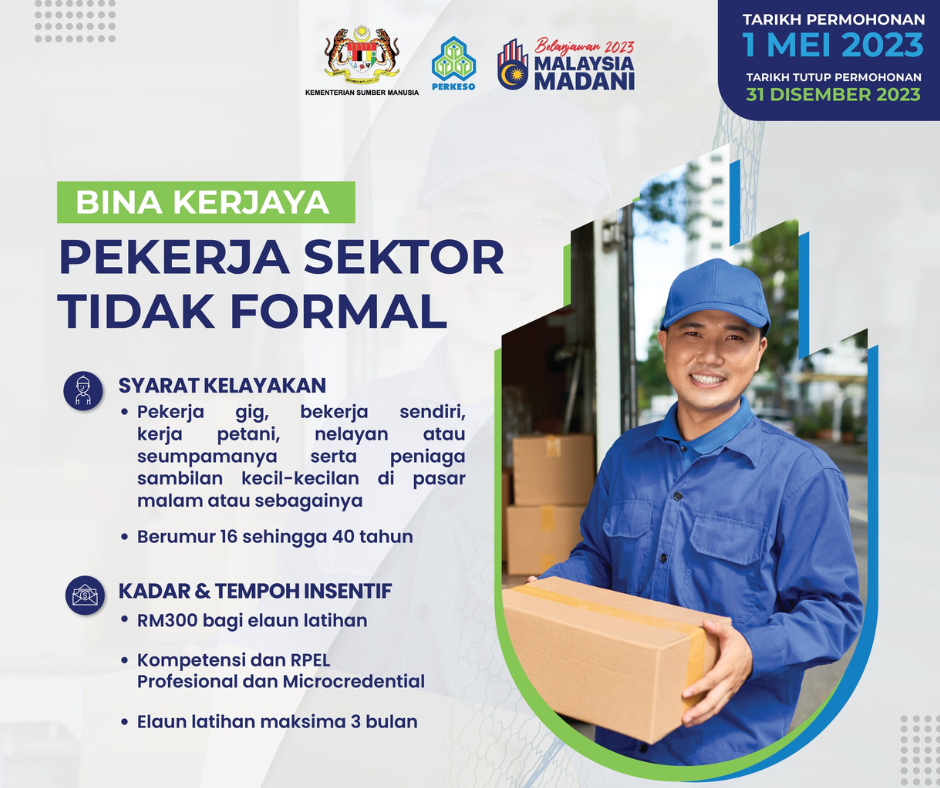Program Kerjaya Madani
Insentif Kerjaya Madani 2023 telah dilancarkan oleh Kementerian Sumber Manusia pada 11 April 2023, dengan peruntukan sebanyak 313 juta.
Insentif ini merangkumi Program Daya Kerjaya, Program Bina Kerjaya dan Pendidikan dan Latihan Teknikal dan Vokasional (TVET).
Insentif kewangan akan diberikan kepada majikan di bawah Program Daya Kerjaya untuk mengambil belia, Orang Asli, wanita, orang kurang upaya (OKU), miskin tegar, orang yang diparol, bekas banduan, graduan TVET atau lepasan sekolah yang menganggur bagi tempoh 2 bulan dan ke atas.
💰 Insentif kewangan adalah RM600 sebulan selama tiga bulan, bermula 1 April 2023, untuk pekerja baharu mulai 1 Januari 2023.

DAYA KERJAYA TVET - Program Latihan
Program Transisi Pekerjaan untuk Perantisan TVET & Lepasan Sekolah merupakan satu insentif latihan yang merupakan Program Latihan Peningkatan Kemahiran (Upskilling) menerusi tanggungan bayaran latihan sehingga RM4,000 mengikut kategori persijilan yang dikhaskan kepada graduan TVET atau lepasan sekolah yang mengganggur sekurang-kurangnya 2 bulan.
Objektif program adalah untuk;
i) Meningkatkan kebolehpasaran dan peningkatan kemahiran
ii) Mengurangkan ketidakpadanan (mismatch) dalam tawaran pekerjaan dan gaji yang tidak setimpal dengan kemahiran (underemployment)
iii) Merangsang permintaan pekerjaan dalam kalangan majikan bagi meningkatkan peluang pekerjaan serta mengurangkan kadar pengangguran
dalam kalangan graduan TVET serta lepasan sekolah.
Kriteria
- 16 hingga 40 tahun pada tarikh permohonan
- Graduan TVET atau lepasan sekolah yang menganggur sekurang-kurangnya bagi tempoh 2 bulan.
- Kelayakan SPM dan ke bawah.
- Individu hendaklah berdaftar dan melengkapkan profil di Portal MYFutureJobs (medan nama, nombor kad pengenalan, alamat, tahap pendidikan dan pengalaman kerja)

BINA KERJAYA - Program Latihan
Program Bina Kerjaya untuk Sektor Tidak Formal adalah satu inisiatif kerajaan yang bertujuan membantu orang yang bekerja sendiri atau bekerja dalam pelbagai pekerjaan tidak rasmi. Matlamat utama adalah memberi pekerja-pekerja ini kemahiran yang diperlukan untuk mendapatkan pekerjaan formal.
Pekerja tidak rasmi dalam program ini boleh termasuk pekerja sementara, individu yang bekerja sendiri, petani, nelayan, dan lain-lain yang bekerja dalam perniagaan kecil seperti peniaga pasar malam. Ia juga merangkumi orang seperti pemandu Grab, pekerja bebas atas talian (seperti mereka dalam e-dagang, pemasaran digital, dan reka bentuk grafik), penghantar makanan, dan profesional kreatif seperti pelukis, ahli muzik, dan jurugambar yang bekerja dalam projek tertentu.
Selain itu, terdapat jenis pekerja tidak rasmi lain dalam program ini, seperti tukang paip dan juruelektrik, tutor bebas yang menyediakan perkhidmatan tuisyen atas talian atau secara peribadi, ejen hartanah bebas yang mendapat komisen, serta instruktur kecergasan bebas, jurulatih peribadi, dan instruktur yoga.
Matlamat program ini adalah memberikan semua individu ini kemahiran yang diperlukan untuk beralih ke pekerjaan yang lebih stabil dan formal.
Kriteria
- 16 hingga 40 tahun pada tarikh permohonan
- Kelayakan SPM dan ke bawah.
- Tidak mempunyai caruman PERKESO di bawah Akta Keselamatan Sosial Pekerja 1969 (Akta 4) dan Akta Sistem Insurans Pekerjaan 2017 (Akta 800) untuk tempoh 6 bulan daripada tarikh permohonan.
- Individu hendaklah berdaftar dan melengkapkan profil di Portal MYFutureJobs (medan nama, nombor kad pengenalan, alamat, tahap pendidikan dan pengalaman kerja)






